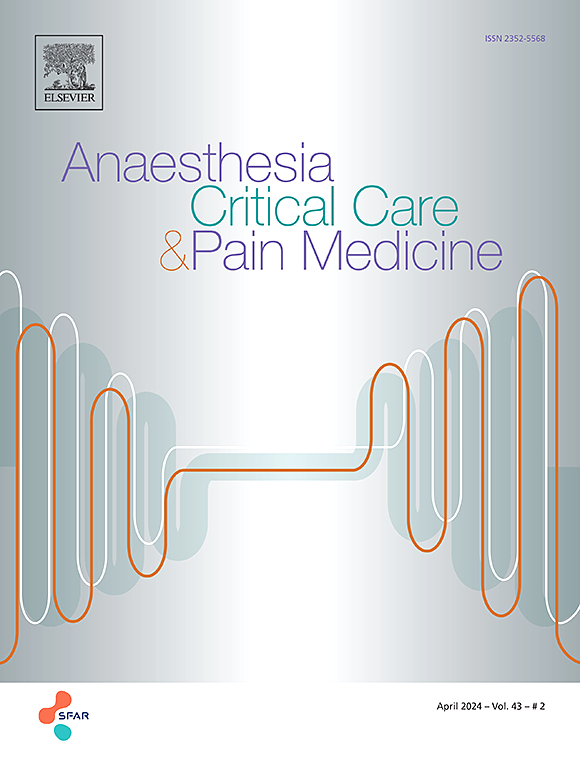Preoperative oral caffeine as prophylaxis against post-spinal hypotension in patients undergoing orthopedic lower limb surgery: A randomized, placebo-controlled, double-blinded study
IF 4.7
3区 医学
Q1 ANESTHESIOLOGY
引用次数: 0
Abstract
Background
This study aimed to investigate the efficacy of preoperative a caffeine tablet as prophylaxis against post-spinal hypotension in adult patients undergoing lower extremity orthopedic surgery.
Methods
Patients aged 18–70 years who underwent lower limb orthopedic surgery were enrolled. In the caffeine group, the patient ingested a 200 mg caffeine tablet. In the control group, the patient ingested a placebo. The primary outcome was the number of patients with one or more hypotensive episodes within the first hour of spinal anesthesia, which was defined as a decrease in mean arterial pressure (MAP) <60 mmHg or a >20% decrease in MAP from baseline. The secondary outcomes were the number of patients who received ephedrine and the amount of ephedrine per patient within the first hour of spinal anesthesia.
Results
80 patients were randomized to the caffeine group (n = 40) and control group (n = 40). One patient in the caffeine group was lost to follow-up. The number of patients with one or more hypotensive episodes within the first hour of spinal anesthesia was significantly lower (p = 0.013) in the caffeine group (n = 6, 15.3%) than in the control group (n = 17, 42.5%). The number of patients who received ephedrine as well as the amount of ephedrine per patient within the first hour of spinal anesthesia were significantly lower in the caffeine group than in the control group.
Conclusion
The preoperative ingestion of a 200 mg caffeine tablet could decrease the number of patients with hypotensive episodes and ephedrine requirements within the first hour of spinal anesthesia.
Registration
Pan African Clinical Trial Registry, registration number PACTR202311786558285, https://pactr.samrc.ac.za/TrialDisplay.aspx?TrialID=26993
术前口服咖啡因预防骨科下肢手术患者脊柱后低血压:一项随机、安慰剂对照、双盲研究
背景:本研究旨在探讨成人下肢骨科手术患者术前服用咖啡因片预防术后低血压的疗效。方法:选取年龄18-70岁接受下肢骨科手术的患者。在咖啡因组,患者摄入了200毫克的咖啡因片。在对照组中,患者服用安慰剂。主要结局是在脊髓麻醉的第一个小时内出现一次或多次低血压发作的患者数量,其定义为平均动脉压(MAP)低于60 mmHg或MAP较基线下降20%。次要结果是接受麻黄碱治疗的患者数量和每位患者在脊髓麻醉的第一个小时内麻黄碱的用量。结果:80例患者随机分为咖啡因组(n = 40)和对照组(n = 40)。咖啡因组中有一名患者没有随访。咖啡因组(n = 6, 15.3%)与对照组(n = 17, 42.5%)相比,腰麻第1小时内出现1次或1次以上低血压发作的患者数量显著降低(p = 0.013)。在脊髓麻醉的第一个小时内,咖啡因组接受麻黄碱治疗的患者数量以及每位患者麻黄碱的用量明显低于对照组。结论:术前服用200 mg咖啡因片可减少患者低血压发作次数和脊髓麻醉1小时内麻黄碱需要量。注册:泛非临床试验注册中心,注册号PACTR202311786558285, https://pactr.samrc.ac.za/TrialDisplay.aspx?TrialID=26993。
本文章由计算机程序翻译,如有差异,请以英文原文为准。
求助全文
约1分钟内获得全文
求助全文
来源期刊

Anaesthesia Critical Care & Pain Medicine
ANESTHESIOLOGY-
CiteScore
6.70
自引率
5.50%
发文量
150
审稿时长
18 days
期刊介绍:
Anaesthesia, Critical Care & Pain Medicine (formerly Annales Françaises d''Anesthésie et de Réanimation) publishes in English the highest quality original material, both scientific and clinical, on all aspects of anaesthesia, critical care & pain medicine.
 求助内容:
求助内容: 应助结果提醒方式:
应助结果提醒方式:


